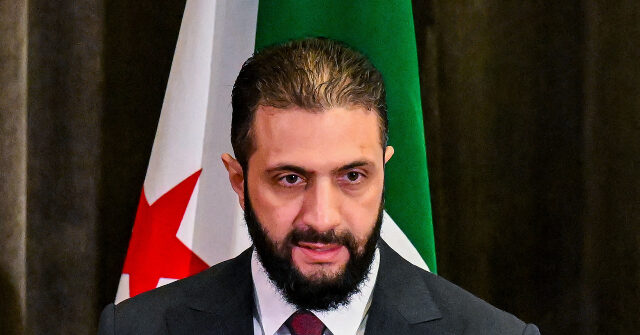Sharaa was the leader of Hayat Tahrir al-Sham (HTS), an al-Qaeda offshoot fighting the regime of ousted dictator Bashar Assad for years following the eruption of civil war in the country in 2011. After over a decade of fighting featuring over ten different warring parties and patrons, HTS made a major breakthrough in November, taking over the city of Aleppo. By December 7, Assad and his family were on a plane to Moscow, where strongman Vladimir Putin offered them political asylum.
HTS has in practice disbanded to evolve into the government of Syria, appointing Sharaa its president. Sharaa dropped his nom de guerre in recognition of the role and replaced his war fatigues with Western-style suits. He has also increasingly made public appearances alongside his wife, First Lady Latifa al-Droubi – often in matching outfits – including some championing women’s education.
Sharaa has not entirely shed his jihadi past, insisting on imposing an Islamist, rather than secular, government on the religiously diverse people of Syria. He has emphasized in public statements a focus on the physical reconstruction of the country before the complete Sunni Islamization of the government, after half a century of Alawite rule under the Assads. Sharaa has become a staple at international investment and banking events, selling Syria as a sound investment in the long term.
The state-run Syrian Arab News Agency (SANA) reported that Sharaa addressed the Saudi Future Investment Initiative Conference 2025 in Riyadh on Wednesday, announcing that his efforts to bring money into Syria had generated significant success.
“We have amended Syria’s investment laws to become among the best in the world, and within the first six months, the country attracted investments worth $28 billion,” Sharaa declared. He did not specify exactly where the money was coming from, but thanked the government of Saudi Arabia in particular for championing the government’s cause and encouraging neighboring countries to consider helping rebuild after the war.
“What the world stands to gain from Syria’s stability is immense, as it occupies a strategic position in the region,” Sharaa posited. “Historically, it has been the gateway to the East and a key part of the famed Silk Road. Syria possesses diverse resources and a multifaceted economy that does not rely on a single sector.”
“We will rebuild everything that was destroyed,” he promised, “and my greatest bet is on the Syrian people, who have endured bitter suffering, remained steadfast in their positions and ultimately triumphed. We want to rebuild Syria through investment, not through aid and assistance.”
The message echoed what Sharaa has offered in remarks to the highest-level international forums. In September, Sharaa made his debut at the United Nations General Assembly, where a Syrian leader had not spoken in decades.
“We call now for the complete lifting of sanctions, so that they no longer shackle the Syrian people,” he requested. “Investment laws have been amended, and major regional and international companies have already begun entering the Syrian market, contributing through investment and reconstruction.”
Referring specifically to the Saudi government, he lauded it as a “supporter of prosperity, stability, and development in Syria. I have been following for years the vision presented by the Saudi Crown Prince, which encompasses the entire region.”
Crown Prince Mohammed bin Salman was among the first world leaders to embrace HTS and Sharaa and has offered significant humanitarian aid to the country. In September, the Saudi government announced that it would give Sharaa’s government 1.65 million barrels of crude oil to help with reconstruction, a gift directly from King Salman.
Through the crown prince, Sharaa received the opportunity to meet with American President Donald Trump in person in May. Trump described himself as impressed by Sharaa, telling reporters he was a “young, attractive guy, tough guy, strong past, very strong past– fighter.”
“He’s got a real shot at pulling it together,” Trump said, later announcing he would lift sanctions on Syria imposed in response to the Assad regime’s human rights abuses and sponsorship of Iran-linked terrorism. Sharaa and HTS fought extensively against both Assad and his Iranian and Russian patrons during the war.
While the relationship with Iran remains broken, Sharaa has accepted some overtures from Russia. The Syrian leader visited Moscow this month, meeting Putin in person and discussing improving the bilateral relationship after years of war. The Kremlin confirmed that high on the list of priorities for Putin was convincing Sharaa to allow Russia to maintain its military presence in Syria, particularly bases in western Latakia that it once used to help Assad fend off HTS attacks.
On Thursday Bloomberg reported, citing flight data, that Russia had resumed military flights to Syria.
Follow Frances Martel on Facebook and Twitter.
Breitbart News
Read the full article .


